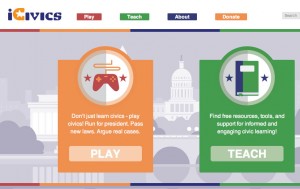
iCivics includes some 19 games built by Filament Games to teach how the government works.
A new study highlights that games built for the classroom can have a major impact on improving grades.
The study of nearly 250 students conducted by Baylor University found that adding two 30-minute sessions of playing Filament’s iCivics games substantially increased scores for most students in the areas of civics education.
“Teachers indicated that their students loved the games and learned without even realizing they were learning complex civics concepts,” Brooke Blevins, assistant professor of curriculum and instruction, said.
Key Findings
- Fourth graders scored an average of nearly 10 points higher on civics tests.
- Students in grades 5 and 8 saw their scores go up nearly 5 points after playing the games.
The study examined how students who played iCivics twice a week for six weeks as part of their civics curriculum performed compared to students who did not pay the game and the Waco-based researchers said the results were clear.
“Students’ scores on a test of civic knowledge significantly improved after playing iCivics for the sample as a whole,” LeCompte said.
iCivics is a suite of 19 different games that allow students to learn about different aspects of the government. The project was built by game designer Filament Games as part of a non-profit effort headed by former Supreme Court Justice Sandra Day O’Connor.
“It was my hope with iCivics we could develop some games that young people can play on a computer and learn how things work, how government works, how they have a role in it and how they can be involved, “ O’Connor said of the effort.
Filament’s Dan White, in talking about their approach to game development, stressed the idea of systems thinking as one of the areas games can effectively teach, but also stressed that their games don’t seek to hide the educational aspects beneath the game play.
“We were really interested in developing games that had an honest dialogue with the player and created systems and identities that the player could inhabit and tinker with that would give them — allow them to have an authentic interaction with the materials we wanted them to learn,” White said.
The Baylor research is the latest in a series of studies to endorse the use of games in the classroom.
